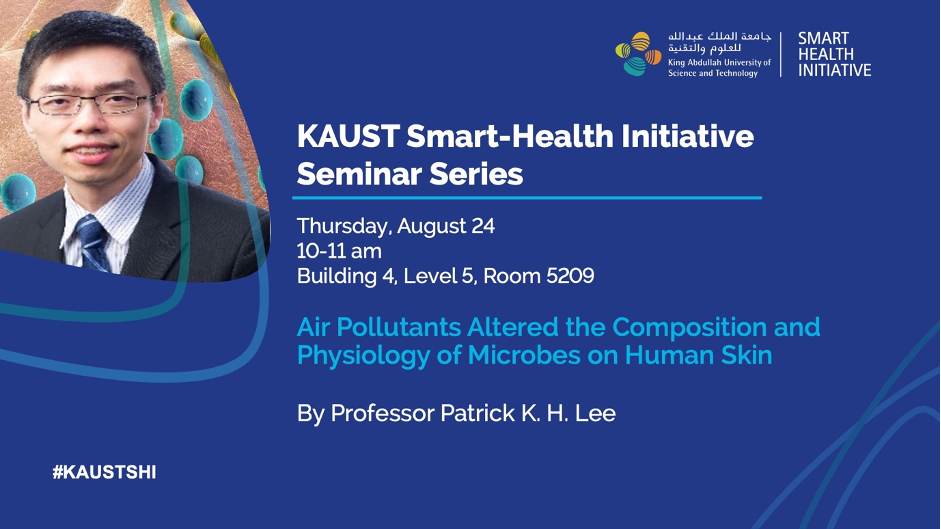
Thursday, August 24
10:00-11:00 a.m.
Building 4, Level 5, Room 5209
Please join us for the next KAUST Smart-Health Initiative (KSHI) seminar:
Air Pollutants Altered the Composition and Physiology of Microbes on Human Skin
By Professor Patrick K. H. Lee, School of Energy and Environment, City University of Hong Kong
Abstract
Human skin is home to a diverse community of bacteria, fungi and viruses, which constitute the skin microbiome and these microbes play important roles in host skin health. While it has been well documented that air pollutants can affect our respiratory system, how they affect cutaneous microbes and in turn skin health remain unclear. Using high-throughput sequencing and metabolomics, we analyzed the skin microbiome of over 200 individuals living in two cities in China with high and low exposure levels of polycyclic aromatic hydrocarbons (PAHs). The results showed that in a dose-dependent manner, chronic exposure to PAHs significantly modified the skin microbiome compositions, including both bacteria and fungi. High PAH exposure was linked to dry skin and the enrichment of bacteria with biodegradation functions, which could potentially aid the hosts to minimize the effects of PAHs. For individuals with low PAH exposure, their skin condition was considered normal and the skin microbiome was enriched with bacteria possessing the arginine biosynthesis pathway.
The arginine from bacteria could be contributing to the synthesis of filaggrin-derived natural moisturizing factors, providing vital hydration for the skin. In contrast, arginine biosynthesis pathway was mostly absent in the bacteria of individuals with high PAH exposure, which explains the observed dry skin. Our recent works found that the composition of viruses on skin and more importantly, the virus-bacteria interactions were also modulated by PAH exposure. In summary, microbes on skin are sensitive to air pollutants and a deeper understanding of the microbial life on skin may allow us to harness their metabolic functions to protect host skin health.
About the speaker
Patrick Lee is a Professor in the School of Energy and Environment at City University of Hong Kong. He received his BS degree in chemical engineering from Queen’s University in Canada in 2001, and his MS and PhD degrees in environmental engineering from the University of California, Berkeley in 2002 and 2007, respectively. From 2008 to 2010, he carried out postdoctoral research also at the University of California, Berkeley. Dr. Lee is the recipient of awards such as the World Cultural Council Special Recognition Award. His research group applies experimental and computational techniques to study environmental microbiome in a systems biology framework, with the goals to understanding the functions of individual bacteria as well as the interactions in a microbial community. Dr. Lee has published ~100 peer-reviewed journal articles, including publications in Cell and Nature Communications. Dr. Lee is an Associate Editor for the journal Water Research X.
Looking forward to seeing you there!
Light refreshments will be provided.

